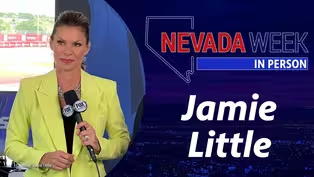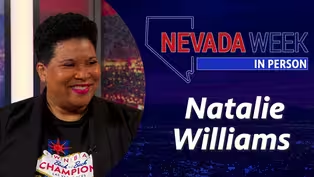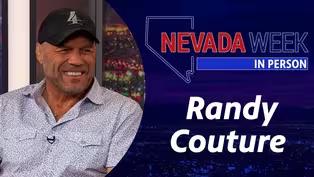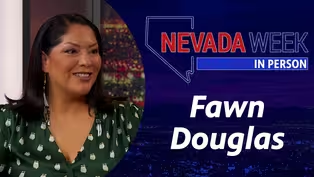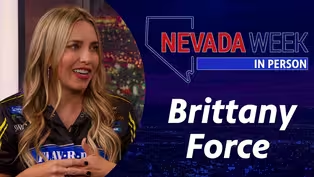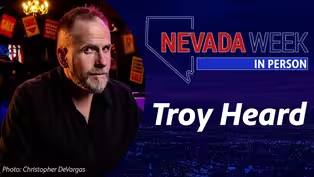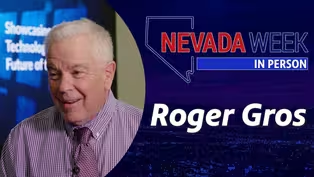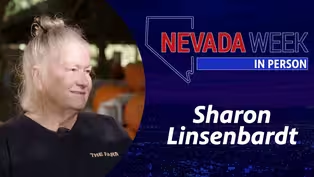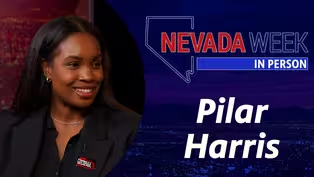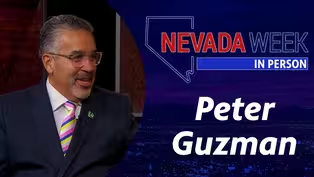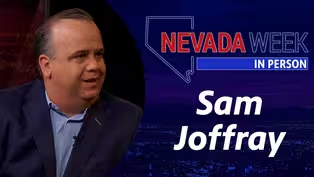
Nevada Week In Person | Don Logan
Season 1 Episode 71 | 14mVideo has Closed Captions
One-on-one interview with Las Vegas Aviators President and COO Don Logan .
One-on-one interview with Las Vegas Aviators President and COO Don Logan .
Problems playing video? | Closed Captioning Feedback
Problems playing video? | Closed Captioning Feedback
Nevada Week In Person is a local public television program presented by Vegas PBS

Nevada Week In Person | Don Logan
Season 1 Episode 71 | 14mVideo has Closed Captions
One-on-one interview with Las Vegas Aviators President and COO Don Logan .
Problems playing video? | Closed Captioning Feedback
How to Watch Nevada Week In Person
Nevada Week In Person is available to stream on pbs.org and the free PBS App, available on iPhone, Apple TV, Android TV, Android smartphones, Amazon Fire TV, Amazon Fire Tablet, Roku, Samsung Smart TV, and Vizio.
Providing Support for PBS.org
Learn Moreabout PBS online sponsorshipMore from This Collection
Nevada Week In Person goes beyond the roundtable discussion of Nevada Week with guests for a more casual conversation about their personal passions, new projects and compelling stories that are overlooked in the flurry of the news cycle.
Nevada Week In Person | Jamie Little
Video has Closed Captions
One-on-one interview with Jamie Little, NASCAR Broadcaster (14m)
Nevada Week In Person | Chet Buchanan
Video has Closed Captions
One-on-one interview with Chet Buchanan,Host & Creator, 98.5 KLUC’s The Chet Buchanan Show (14m)
Nevada Week In Person | Natalie Williams
Video has Closed Captions
One-on-one interview with Natalie Williams, General Manager, Las Vegas Aces (14m)
Nevada Week In Person | Randy Couture
Video has Closed Captions
One-on-one interview with Randy Couture, UFC Hall of Famer & U.S. Army Veteran (14m)
Nevada Week In Person | Fawn Douglas
Video has Closed Captions
One-on-one interview with Fawn Douglas, Artist and Activist, Nuwu Art (14m)
Nevada Week In Person | Brittany Force
Video has Closed Captions
One-on-one interview with Brittany Force, World Champion Drag Racer (14m)
Nevada Week In Person | Troy Heard
Video has Closed Captions
One-on-one interview with Troy Heard, Artistic Director, Majestic Repertory Theatre (14m)
Nevada Week In Person | Roger Gros
Video has Closed Captions
One-on-one interview with Roger Gros, Publisher, Global Gaming Business Magazine (14m)
Video has Closed Captions
One-on-one interview with Sharon Linsenbardt, Owner, Las Vegas Farm and Barn Buddies Rescu (14m)
Nevada Week In Person | Pilar Harris
Video has Closed Captions
One-on-one interview with Pilar Harris (14m)
Nevada Week In Person | Peter Guzman
Video has Closed Captions
One-on-one interview with Latin Chamber of Commerce Nevada President & CEO Peter Guzman (14m)
Nevada Week In Person | Sam Joffray
Video has Closed Captions
One-on-one interview with Sam Joffray, President & CEO, Las Vegas Super Bowl LVII Host Com (14m)
Providing Support for PBS.org
Learn Moreabout PBS online sponsorshipHe's the man in charge of Las Vegas' longest running professional sports franchise.
Don Logan, President of the Las Vegas Aviators, is our guest this week on Nevada Week In Person.
♪♪♪ Support for Nevada Week In Person is provided by Senator William H. Hernstadt.
Welcome to Nevada Week In Person.
I'm Amber Renee Dixon.
Sports Business Journal called him not only one of the most influential sports executives in Las Vegas, but in all of professional baseball.
Approaching 40 years with Las Vegas' Triple-A baseball team, Don Logan, President and COO of the Las Vegas Aviators, thank you for joining Nevada Week In Person.
-Thanks for having me.
-So 1984 you become an account executive with what was then the Las Vegas Stars.
You begin working your way up.
You become GM, then to the post you've held for the last 20 years as president.
If my timeline is correct, this has been one sport your entire professional career with one organization.
Why?
(Don Logan) Well, it's not just that.
We in the late night, people that lived here awhile, we had the Las Vegas Thunder hockey team.
We played at the Thomas & Mack Center.
So we branched into-- the team sold in 1992.
Some Southern California investors got involved.
We had three baseball teams and a hockey team.
So-- -You were involved in that hockey team as well.
-Got involved in the team pretty actively: put ice in the Thomas & Mack, reconfigured it, played there for seven seasons.
That didn't work out financially so well, but we created an alliance then with a gentleman named Peter Guber, a movie producer in Los Angeles.
Peter called out of the blue one day and said he wanted to learn the sports business, and he thought Minor League Baseball was a good way to do that, and Minor League Hockey.
So we created Mandalay Sports.
We ended up with eight teams around the country.
So I was always based in Vegas, but I was involved in Dayton, Ohio--some real hotspots--Dayton; Scranton; Wilkes-Barre; Hagerstown, Maryland; Frisco, Texas; Lake Elsinore; Rancho Cucamonga.
We had-- I got around a little bit.
I wasn't always just-- I still had control of this, but I got around some.
-You mentioned some of those smaller cities.
You are from a small historic mining town of Tonopah, Nevada, grew up there.
What kind of impact do you think that had on you?
-Oh, I think-- I don't think if you respect where you come from, anywhere, wherever it might be, I don't think you can ever be truly successful because you have to be grounded.
You got to believe in what you've learned.
Things happen when you're growing up that really you don't have any control over, but you learn.
In a small town like that, you learn respect.
You learn that nobody's going to do anything for you; you have to work.
We can't-- You know, there's one grocery store and five gas stations, and it's someplace where you, you know, you have to be able to make do for yourself.
And I think that that's been the foundation that that created with me, and I've never been afraid to get up and go to work.
I'm not afraid to stay late if that's what it takes.
And a lot of those characteristics really, I think, are embedded in you when you grow up in a small town like that.
And then you go back and you see people that have stayed there, and it's always going to be the most special place.
My grandmothers, both grandmothers' houses, the house I grew up in, it's, it's very special.
It's a very surreal part of me.
If ever I start thinking I'm pretty cool, I remember where I come from and how I'd get treated if I acted that way up there, and it wouldn't be very nice.
So I try-- It keeps me grounded, I hope.
-And you still visit.
You're going for Memorial Day.
-Oh, yeah.
Jim Butler Days, big time up there, man.
You wouldn't want to miss it.
-Well, tell me about Jim Butler.
-Jim Butler is the guy that founded Tonopah.
He picked up a rock to throw at his burrow, and it was a real heavy rock, and he realized it was silver.
Right after the Comstock Lode in Virginia City, Tonopah then became the mining-- Goldfield, just 26 miles south of us in Tonopah.
It was a mining mecca for a while.
And still is to this day, but not nearly as large as it once was.
-Back to baseball.
Why baseball?
I haven't been able to find that out in my research of you.
-It was just a game, and my parents-- my dad was an educator, but a real good athlete, played basketball in college at University of Utah.
He was a big dude.
You wouldn't know that I was his kid.
I mean, how this happened, I mean, I'm the runt of the family by far.
-Okay.
-But he played fastpitch softball, so I was always with him as a kid growing up and fell in love with baseball that way.
And then we went to my-- His family was from San Francisco originally.
So we made an annual trip to San Francisco to visit family, and we went to a Giants game.
Willie Mays, Willie McCovey, Jimmy Ray Hart, I could tell you the whole crew.
But the first time I walked into then Candlestick Park, I was hooked.
And from that point on, I was always a baseball first guy.
Now, a small town like that, you know, you play everything.
I played football and basketball.
Was a decent small school athlete, but baseball was always my first love and never changed.
-Okay.
So let's fast forward now to the Aviators.
The Pacific Coast League is the league in which the Aviators play.
And in 2018, you became the first three-time winner of the PCL's Executive of the Year Award.
When you won, the league's president said about you, "Executives across our league value his instincts and unique insights."
Can you tell me about a time in which your insights or instincts really served you well?
-Well, again, I think the instincts come from my upbringing, a lot of that real strong family, you know, everything-- -How many siblings do you have?
-Just one.
-Okay.
-Yeah.
But cousins, we were all in a small town.
You're like everybody's-- Even if you're not blood relatives, there's a, there's a kinship that develops there.
That's a big part of it, and you have insight.
I have been blessed with really good instincts for people and situations.
And as I've, you know, through the years, learned baseball, dealing with-- you're dealing with-- You know, there's some carny-type guys that try to get into owning teams or to running teams and developing ideas that are kind of harebrained.
You've got passive guys who think that baseball is slow and easy, and they get in and they're going to drag us down.
And, you know, I was-- I ran the PCL Executive Committee for 20-some years and was a part of getting to meet and interview potential ownership groups, potential management teams.
And, again, I attribute any of that what Branch said was, was really tied to my upbringing.
I have a pretty good read on people.
That's why I know you're a good soul, Amber.
I miss having you on a regular basis.
Come over and check us out.
-I appreciate that.
But you're leading me into this, your instincts on the owner of the Oakland Athletics.
-John's a really nice man.
He is-- His family founded GAP.
-Yes.
-And has branched off into a number of other companies and retail operations and multi developments all over the world.
But really a good guy.
You know, I think-- -You can be a good guy, but is he a good owner of a baseball team?
-I think the hard thing for him is in Oakland, you know, I mean, the Raiders came here, the Warriors moved to San Francisco.
I mean, there's a reason, unfortunately for Oakland.
Because I had an uncle that lived-- he might be a great-great uncle.
He lived in Oakland.
He worked at San Francisco Chronicle .
So it's just things changed in the Bay Area.
Everything kind of shifted south, and you know, it's-- John will be, he will enhance-- he does enhance any community he's in.
He's a good man.
I can, I can unequivocally tell you that.
-So then him being a billionaire and asking for public financing, what would you say about that?
-Well, I don't think people really understand maybe how the whole economic model works in, not just professional sports, but in business in general.
I think it came out yesterday, this will be, of all the stadium projects, if it ultimately gets through, it will be the third smallest amount of public support ever given.
Much different than what Allegiant was, you know.
Obviously, that's been great for the community.
I think if people just step back and look at how great Allegiant has been, you know, how great the Golden Knights have been, you know, what Major League Baseball does, I mean, history in sports starts with baseball.
There was no NFL.
There was no NBA.
There was no NHL.
There was Major League Baseball and the Yankees and the Red Sox, the Cubs, some of the founding that traditional, you know-- I think hockey calls it the original six or something.
I don't know how many baseball the original was, but it has roots deeper than anything.
So baseball will, in a town that is a baseball town.
Look at how many players we have playing professionally at the Minor League level at the Major League level.
How many kids in college around the country are from here?
I mean, this is a baseball first town.
So baseball, Major League Baseball, I think will do very well here.
-Even though they are the worst team in all of Major League Baseball right now?
-Well, they are, but you know.
What has happened, you know, because the economic model didn't work for them in Oakland, simply people didn't show up.
And you have to have, you have to have bodies in the stadium.
There's two sides to that.
People would say that they, if you win, I'll show up.
That's a decrepid stadium.
I grew up-- The first professional football game I ever went to was there.
I watched Daryle Lamonica and Lenny Dawson play Monday Night Football.
So, you know, I-- There's a soft spot for the Coliseum with me.
But the last few times I've been there, the smells, the areas you can't go to because they're environmentally unsafe because the sewers leak, and it's not right that fans should have to put up with that.
It's not right the team should have to put up with that.
And unfortunately, they never got anything done for them.
-And perhaps a little bit of a similar situation that you faced with Cashman Field and trying to move to Summerlin.
You've talked about the Las Vegas Ballpark being, I think, your biggest accomplishment.
-I think the Las Vegas Ballpark has been, certainly for me, the best and most gratifying project I've been involved with.
And, you know, it took being in an area like Summerlin.
Again in that Cashman was great for a while, and then over a period of time, and I've said this publicly quite a few times, that the-- all the energy in the development downtown was south of the 95.
And everybody kind of forgot about north of 95.
And, you know, they put the Grant Sawyer Building there now, and now they're talking about needing to knock that down or to move all the state offices somewhere else.
You know, it's unfortunate that that side of the, the north side of 95 just, it got rundown.
And when the opportunity, the Howard Hughes Corporation approached me and we talked about, you know, what could happen, we went and took the-- We went around the country and saw what Triple-A baseball and professional baseball, we went to a lot of big league stadiums too, to get a sense of what it does for a community, what it does for just a specific area like Summerlin, with Downtown Summerlin, with the Red Rock Resort, with all the, you know, every type of home, multifamily, single family, accessibility off the 215, Charleston, Sahara, Town Center.
You couldn't have a better place to build a stadium.
So it's hard to screw that up.
-We are running out of time, but I want to know how you personally measure success in Minor League Baseball.
-I think you measure it by, you know, everybody would say obviously it's a, it's a business and it's got to be profitable.
But I measure it by the number of positive comments I get.
We had the West Coast Conference.
It wasn't even Minor League Baseball, college baseball last night.
But Terry Cottle, my longtime UNLV administrator and CSN administrator, brought his four grandkids out.
And the smiles and that, that when you see the kids smile and you see people coming back time and again, that's how you know you're successful.
-You also told Forbes last year that the Aviators are by far the top revenue generating team in Minor League Baseball.
Congratulations on that.
And Don Logan, President of Las Vegas Aviators, thank you for your time.
-Thanks, Amber.
♪♪♪

- News and Public Affairs

Top journalists deliver compelling original analysis of the hour's headlines.

- News and Public Affairs

FRONTLINE is investigative journalism that questions, explains and changes our world.












Support for PBS provided by:
Nevada Week In Person is a local public television program presented by Vegas PBS
